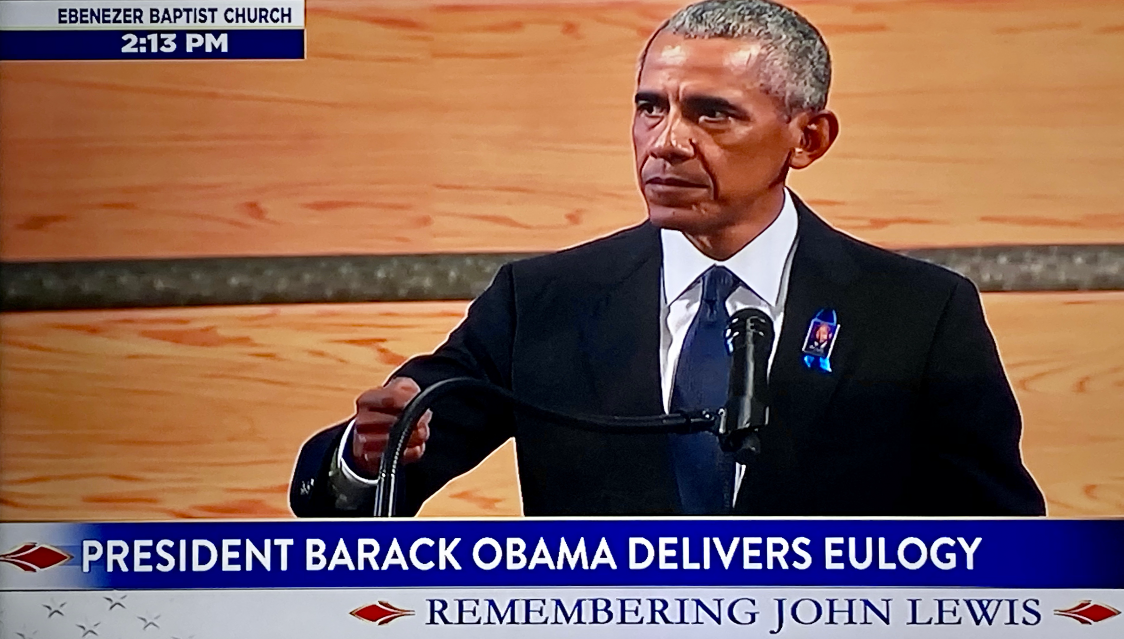He said it. He finally said it. Kill the filibuster.
At long last, President Barack Obama has joined the team to officially unblock and unlock the desperately broken US Senate.
As he eulogized his hero, the Honorable John R. Lewis, the former president first talked about fighting for voting rights and un-rigging gerrymandered House districts that violate the principles of a representative republic.
Then Obama articulated his support for a reform that would finally allow the other reforms to pass. Eliminating the filibuster would disallow a minority in the Senate — representing as few as 11 percent of Americans — from completely freezing the process of voting on a bill. Getting rid of it would mean that the Senate would once again be able to pass laws by a simple, 51-vote majority; sort of like how the Constitution intended for the process to work.
Right after he emphasized the importance of prohibiting gerrymandering and the restoration and advancement of voting rights, the president proclaimed: “If all this takes eliminating the filibuster, another Jim Crow relic, in order to secure the God-given rights of every American, then that’s what we should do.”
Just five years ago, when I first made the argument in Unlock Congress to kill the filibuster in its entirety, it was a far more controversial proposal. Many progressives as well as “traditionalists” in the Senate — on both sides of the aisle — thought it heresy. But that opposition is rapidly withering.
Americans have lost confidence in and run out of patience with a legislature that consistently fails to legislate. They’ve had it with seeing their tax dollars go to fund a defective product.
Today Obama joined other prominent national politicians who have announced their support for eradicating the filibuster. Constitutional scholar Emmet Bondurant and I wrote about these developments during the 2020 presidential primary and what they might soon portend for the Senate.
The president’s pronouncement is hugely newsworthy, and it’s thrilling because it gets us that much closer to ridding ourselves of this unconstitutional and counterproductive albatross. It gets us that much closer to allowing majority rule — as outlined in our nation’s founding document — to channel the will and the wishes of “we the people” through our elected representatives.
If you’re wondering how the Senate can actually switch a rule requiring 60 votes to one that only requires 51 votes — and do it by the very 51 votes that the filibuster prohibits — you’re not crazy. It’s the Senate rules that are ridiculous.
Changing the rules through a simple majority in the Senate is referred to as exercising “the nuclear option.” Pretty melodramatic.
But over the last decade, leaders from both parties have indeed gone nuclear. Senator Harry Reid (D-NV) dropped the hammer first, allowing certain presidential appointments to pass with 51 votes.
At the time, Minority Leader Mitch McConnell (R-KY) decried the move as Armageddon: “No majority leader wants written on his tombstone that he presided over the end of the Senate. Well, if this majority leader caves to the fringes and lets this happen, I’m afraid that’s exactly what they’ll write.”
It wasn’t the end of the Senate. The Senate still exists, as does Americans’ low opinion of both it and the US House. And that public opinion is exactly what drives our elected leaders to take action.
While President Obama’s public endorsement of dropping the 60-vote rule is a big deal, it doesn’t necessarily mean that 51 Senate Democrats will immediately fall in line in the event that they recapture the majority.
That’s where we come in. We must be vocal in continuing to apply pressure to all 100 members of what was once seriously described as “the world’s most deliberative body.”
The US Senate is no longer such a body. It is a sclerotic mess. And it’s time to unlock it.
Jump on board, my fellow Americans. Let’s reform the rules in order to restore the system.
** Read a case study from Unlock Congress to learn how the filibuster blocks legislation favored by huge majorities of the American people.


